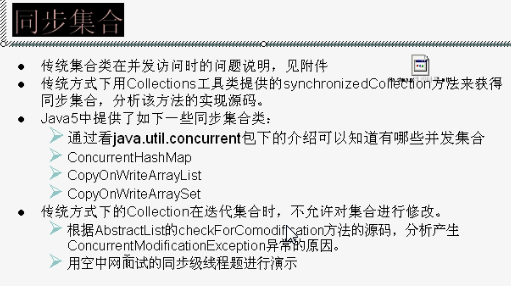线程高级应用-心得8-java5线程并发库中同步集合Collections工具类的应用及案例分析
1. HashSet与HashMap的联系与区别?
区别:前者是单列后者是双列,就是hashmap有键有值,hashset只有键;
联系:HashSet的底层就是HashMap,可以参考HashSet的类源码,默认构造方法为:
public HashSet(){
map = new HashMap<key,Object>
}
就是HashSet只用HashMap的键,而不用他的值,前者的值可以程序员随便指定,反正不用
2. 线程并发库中的集合优路劣之分
HashMap和HashSet如果在成千上万个线程并发的时候会使cup占满;这时java5线程并发库中开发了新技术并发库集合;可以使用其中的ConcurrentMap,也可以在HashMap的使用时加上同步锁synchronized;其实ConcurrentMap类的编写中就是在重写原来HashMap中的所有方法,只是返回值是原来的方法加上了一个同步锁
3.同步集合

1 4.下面举一个线程并发库集合中的类的案例应用,这个案例比较贴近改知识点的说明 2 package com.java5.thread.newSkill; 3 4 import java.util.ArrayList; 5 import java.util.Collection; 6 import java.util.Iterator; 7 import java.util.concurrent.CopyOnWriteArrayList; 8 9 public class CollectionModifyExceptionTest { 10 11 /** 12 * @param args 13 */ 14 public static void main(String[] args) { 15 16 //CopyOnWriteArrayList为线程并发库集合中的类,可以避免HashMap中的并发异常 17 /* 18 * 直接使用传统的ArrayList会出现各式各样的线程并发异常异常,有兴趣的可以试试 19 */ 20 Collection<User> users = new CopyOnWriteArrayList<User>(); 21 //Collection<User> users = new ArrayList<User>(); 22 users.add(new User("杨凯", 21)); 23 users.add(new User("杨旋", 20)); 24 users.add(new User("潇洒", 22)); 25 Iterator itrUsers = users.iterator(); 26 while (itrUsers.hasNext()) { 27 User user = (User) itrUsers.next(); 28 if ("潇洒".equals(user.getName())) { 29 users.remove(user); 30 } else { 31 System.out.println(user); 32 } 33 } 34 } 35 36 } 37 38 辅助类:User类 39 package com.java5.thread.newSkill; 40 41 public class User { 42 43 private String name; 44 private int age; 45 User(String name, int age) { 46 super(); 47 this.name = name; 48 this.age = age; 49 } 50 51 public String getName() { 52 return name; 53 } 54 55 public void setName(String name) { 56 this.name = name; 57 } 58 59 public int getAge() { 60 return age; 61 } 62 63 public void setAge(int age) { 64 this.age = age; 65 } 66 67 @Override 68 public int hashCode() { 69 final int prime = 31; 70 int result = 1; 71 result = prime * result + age; 72 result = prime * result + ((name == null) ? 0 : name.hashCode()); 73 return result; 74 } 75 @Override 76 public boolean equals(Object obj) { 77 if (this == obj) 78 return true; 79 if (obj == null) 80 return false; 81 if (getClass() != obj.getClass()) 82 return false; 83 User other = (User) obj; 84 if (age != other.age) 85 return false; 86 if (name == null) { 87 if (other.name != null) 88 return false; 89 } else if (!name.equals(other.name)) 90 return false; 91 return true; 92 } 93 @Override 94 public String toString() { 95 return "User [age=" + age + ", name=" + name + "]"; 96 } 97 @Override 98 protected Object clone() throws CloneNotSupportedException { 99 return super.clone(); 100 } 101 102 }



